外研版(2019)高中英语选择性必修第二册 Unit3Times change Review 精品课件(共26张PPT)
文档属性
| 名称 | 外研版(2019)高中英语选择性必修第二册 Unit3Times change Review 精品课件(共26张PPT) | 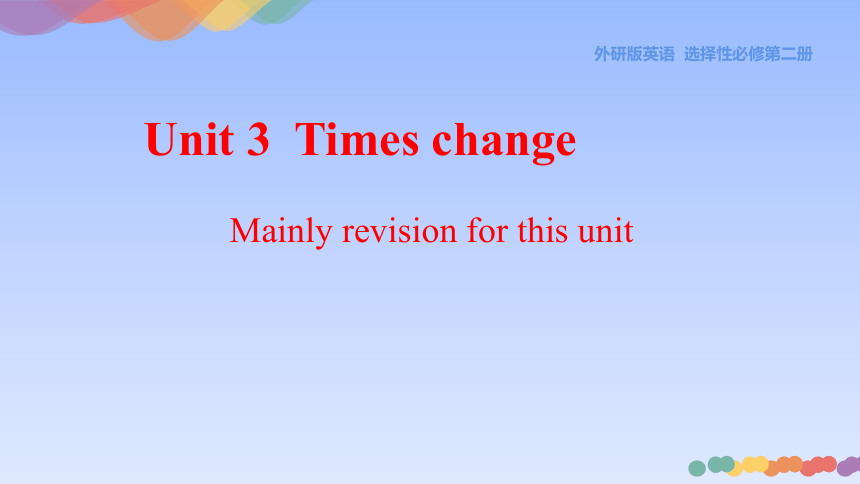 | |
| 格式 | pptx | ||
| 文件大小 | 228.7KB | ||
| 资源类型 | 教案 | ||
| 版本资源 | 外研版(2019) | ||
| 科目 | 英语 | ||
| 更新时间 | 2023-03-03 16:20:25 | ||
图片预览

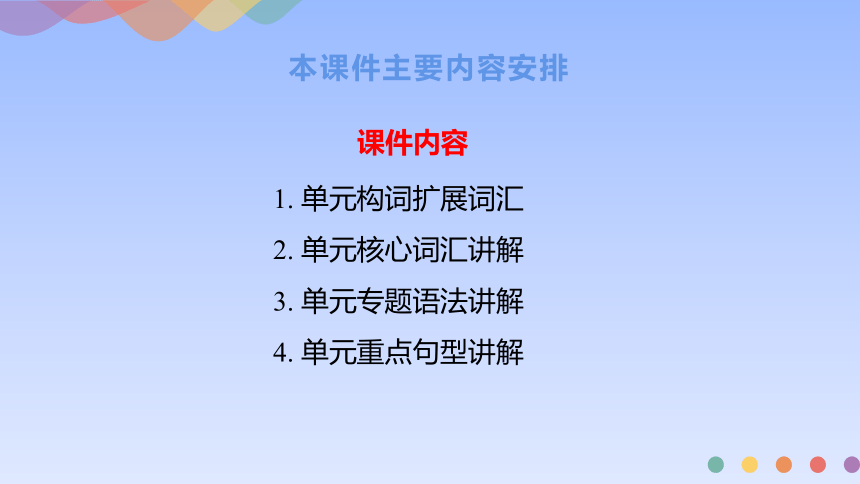
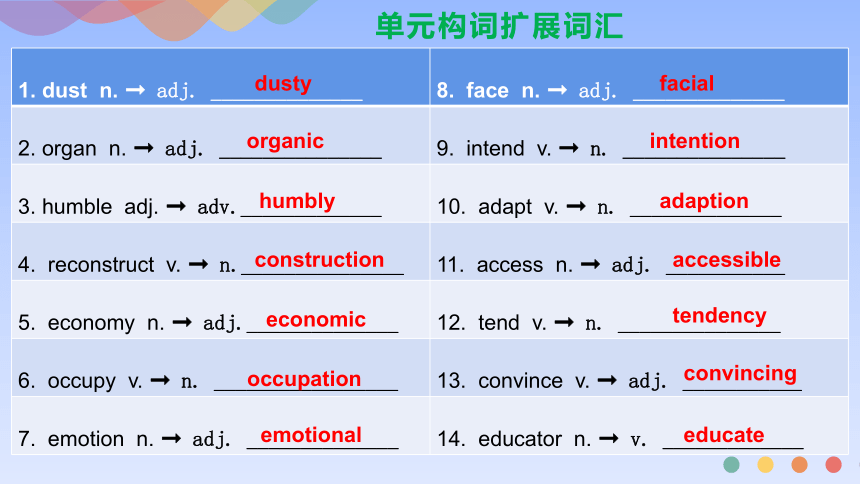
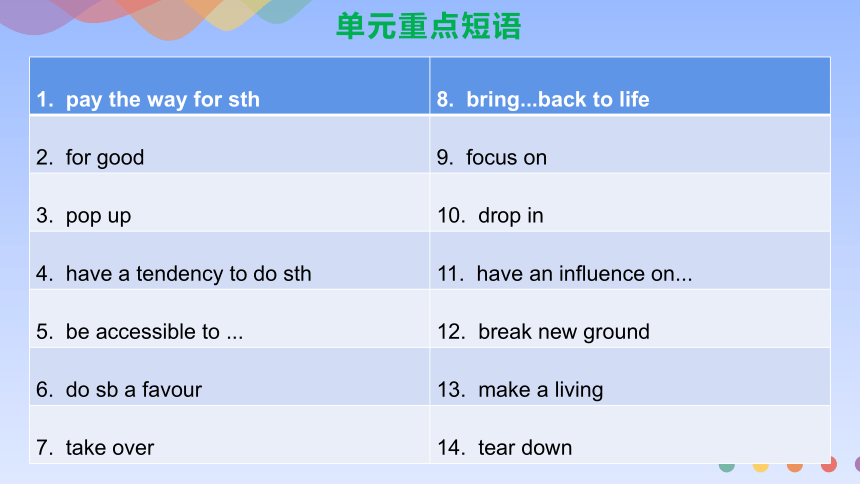
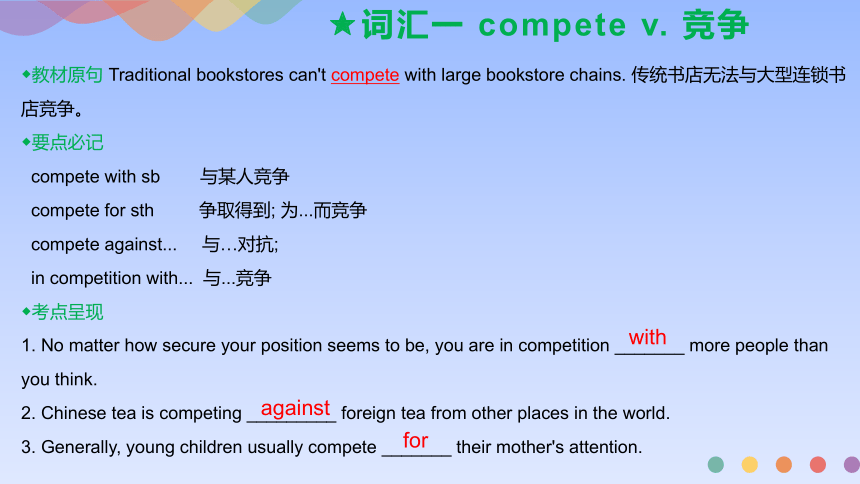
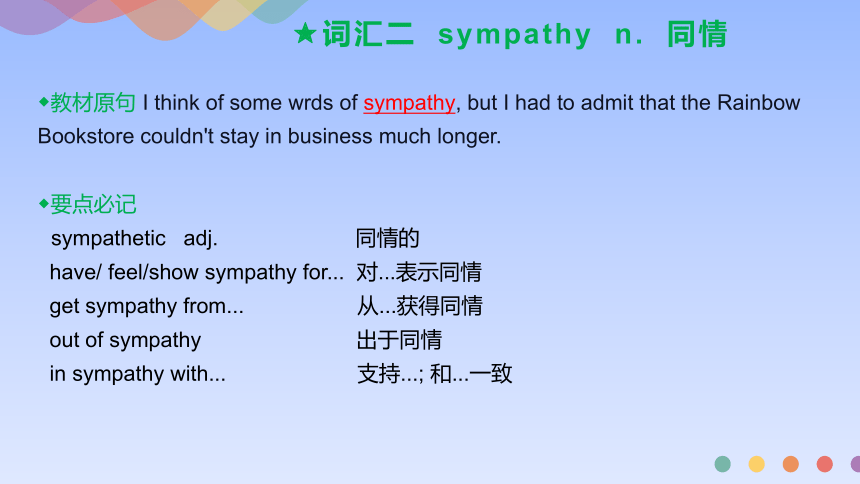
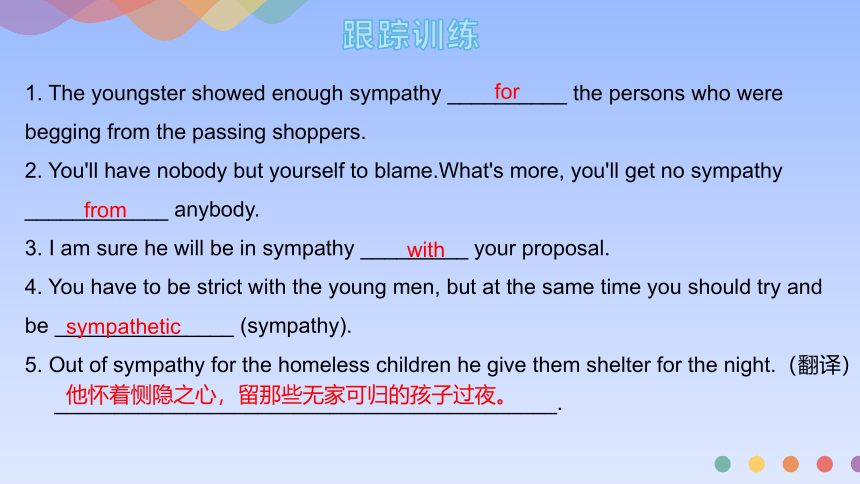
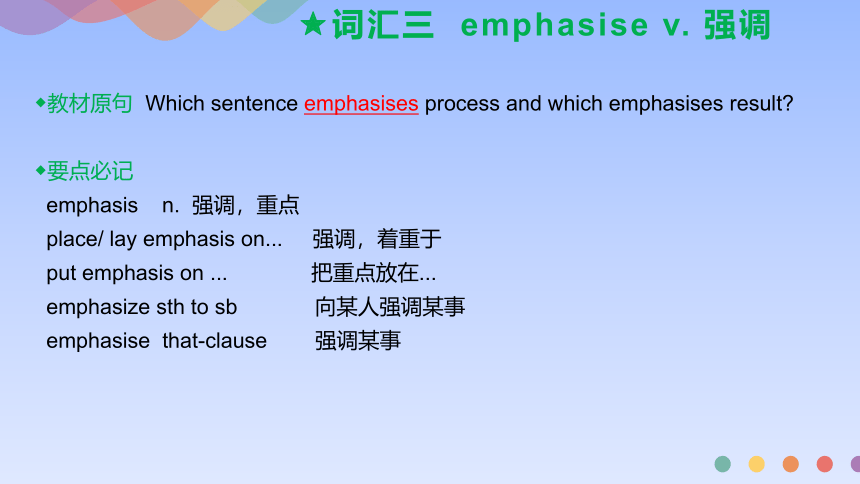
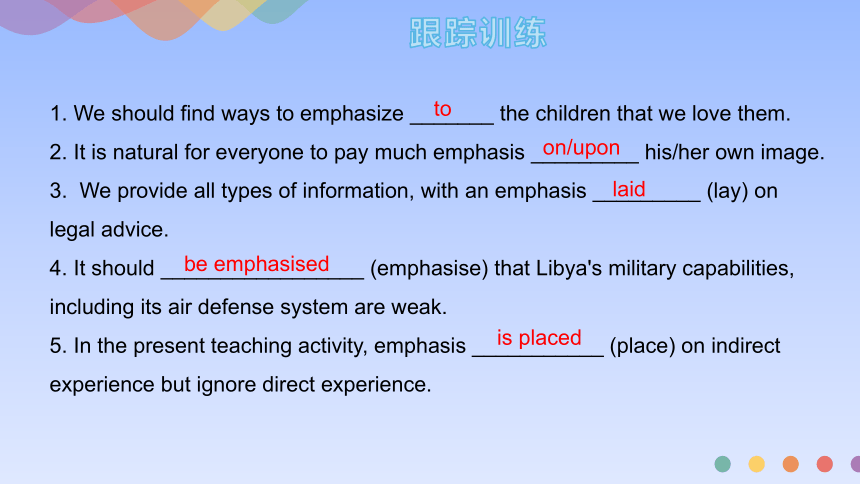
文档简介
(共26张PPT)
外研版英语 选择性必修第二册
Unit 3 Times change
Mainly revision for this unit
本课件主要内容安排
课件内容
1. 单元构词扩展词汇
2. 单元核心词汇讲解
3. 单元专题语法讲解
4. 单元重点句型讲解
单元构词扩展词汇
1. dust n. adj. ______________
8. face n. adj. ______________
2. organ n. adj. _______________
9. intend v. n. _______________
3. humble adj. adv._____________
10. adapt v. n. ______________
4. reconstruct v. n._______________
11. access n. adj. ___________
5. economy n. adj.______________
12. tend v. n. _______________
6. occupy v. n. _________________
13. convince v. adj. ___________
7. emotion n. adj. ______________
14. educator n. v. _____________
dusty
organic
humbly
construction
economic
occupation
emotional
facial
intention
adaption
accessible
tendency
convincing
educate
单元重点短语
1. pay the way for sth
8. bring...back to life
2. for good
9. focus on
3. pop up
10. drop in
4. have a tendency to do sth
11. have an influence on...
5. be accessible to ...
12. break new ground
6. do sb a favour
13. make a living
7. take over
14. tear down
词汇一 compete v. 竞争
◆教材原句 Traditional bookstores can't compete with large bookstore chains. 传统书店无法与大型连锁书店竞争。
◆要点必记
compete with sb 与某人竞争
compete for sth 争取得到; 为...而竞争
compete against... 与…对抗;
in competition with... 与...竞争
◆考点呈现
1. No matter how secure your position seems to be, you are in competition _______ more people than you think.
2. Chinese tea is competing _________ foreign tea from other places in the world.
3. Generally, young children usually compete _______ their mother's attention.
with
against
for
词汇二 sympathy n. 同情
◆教材原句 I think of some wrds of sympathy, but I had to admit that the Rainbow Bookstore couldn't stay in business much longer.
◆要点必记
sympathetic adj. 同情的
have/ feel/show sympathy for... 对...表示同情
get sympathy from... 从...获得同情
out of sympathy 出于同情
in sympathy with... 支持...; 和...一致
跟踪训练
1. The youngster showed enough sympathy __________ the persons who were begging from the passing shoppers.
2. You'll have nobody but yourself to blame.What's more, you'll get no sympathy ____________ anybody.
3. I am sure he will be in sympathy _________ your proposal.
4. You have to be strict with the young men, but at the same time you should try and be _______________ (sympathy).
5. Out of sympathy for the homeless children he give them shelter for the night.(翻译)
__________________________________________.
sympathetic
with
from
for
他怀着恻隐之心,留那些无家可归的孩子过夜。
词汇三 emphasise v. 强调
◆教材原句 Which sentence emphasises process and which emphasises result
◆要点必记
emphasis n. 强调,重点
place/ lay emphasis on... 强调,着重于
put emphasis on ... 把重点放在...
emphasize sth to sb 向某人强调某事
emphasise that-clause 强调某事
跟踪训练
1. We should find ways to emphasize _______ the children that we love them.
2. It is natural for everyone to pay much emphasis _________ his/her own image.
3. We provide all types of information, with an emphasis _________ (lay) on legal advice.
4. It should _________________ (emphasise) that Libya's military capabilities, including its air defense system are weak.
5. In the present teaching activity, emphasis ___________ (place) on indirect experience but ignore direct experience.
to
on/upon
laid
be emphasised
is placed
词汇四 expand v.扩大,增加
◆教材原句 Now there are more than 3000 emojis that expand upon the way in which we communicate.
◆要点必记
expansion n. 膨胀, 扩展,扩充
expand on 详述,进一步说明
expand... into... 扩大成...
expand wings 展开翅膀
expand the production 扩大生产
跟踪训练
1. The director plans to expand the firm __________ an international company.
2. You will have to expand_________ your argument if you want to convince me.
3. Last year, the program ______________ (expand) to all public schools in the city.
4. With the ______________ (expand) of cities, many people sell off their old houses in the countryside and move into new flats in cities.
5. The rapid expansion of cities can cause social and economic problems, such as pollution and traffic problems. (翻译)
____________________________________________________。
into
on
was expanded
expansion
城市的快速发展可能引起社会和经济问题,比如污染和交通问题
词汇五 intention n. 意图,目的
◆教材原句 The intention of these adaptations is to make the classics more accessible to young readers.
◆要点必记
intend v. 打算,想要;意指
intend to do/doing sth 打算做某事
intend sb to do sth 打算让某人做某事
be intended for 专供...使用
intend that-clause
with the intention of 抱有...的目的
跟踪训练
1. This sum of money______________ (intend) for the development of the tourist industry.
2. The programme was set up with an _____________ (intend) of providing help to the homeless.
3. The famous writer clearly intends his readers ____________ (identify) with the main character.
4. It is intended ________ production will start at the end of the month.
5. The intention was not just ___________ (stop) new arrivals, but also to exclude those already living in Australia.
is intended
intention
to identify
that
to stop
词汇六 tendency n. 趋势
◆教材原句 As we can see, emojis have a tendency to pop up all over the places.
◆要点必记
tend v. 倾向;趋于
tend to do sth 往往/常常会做某事
tend towards 趋向;走向
have a tendency to do sth 有发生某事的趋势
taken a new tendency to/towards... 呈现...的新趋势
跟踪训练
1. There is a tendency________ this disease to run in families.
2. Matters have taken a new tendency _______________ peace.
3. There is a tendency ___________ (use) plastics in place of metals at present.
4. People tend __________ (think) that the problem will never affect them.
5. Single parents tend to grant more independence to their children than other parents do. (翻译)
____________________________________________________
to think
to use
to/ towards
for
单亲父母往往比其他父母给予孩子们更多的自主性。
词汇七 convincing adj. 有说服力的,使人信服的
◆教材原句 What supporting arguments does the author give to make the point convincing
◆要点必记
convince v. 使人信服
convince sb to do sth 说服某人某事
convince sb of sth 使某人相信某事
be convinced that-clause 确信...
make sth convincing 使某事有说服力
跟踪训练
1. The scientists say that there is no ________________(convince) evidence that power lines have anything to do with cancer.
2. They believe that a leader is one who is convinced _______ her beliefs and can convince others.
3. Jennifer _______________(convince) that she would profit from a more relaxed lifestyle.
4. They try their best to convince us _________ (take) an interest in this subject
5. ____________ (convince) his friend would survive, he told the coast guard where they parted.
was convinced
of
convincing
to take
Convinced
语法 过去进行时的被动语态
◆ 定义:
表示在过去某个时刻正在进行的或者某时段一直进行的被动动作。
◆ 基本结构:
1. 肯定式: “主语+ “was/were being done ...”;
2. 否定式: “主语+ “was/were + not being done ...”;
一般疑问: “Was/ Were +主语+ being done...”.
◆ 判断应用(看时间,判语境)
1. 定义法:
2. 时间标志: 如,at 8:00 yesterday;at this time last week 等;
3. 语境:如,
a. When the person in black entered the lab, the experiment was being done. (一个过去动作发生的同时,另一动作正在被执行。)
b. Yesterday I saw that some teenagers were being questioned about the matter then. (受主句过去的动作暗示或者影响,从句的动作正在被执行。)
跟踪训练
1. These young trees from the farm ___________________ (plant) in the garden at this time yesterday.
2. The other day, I rushed to the reading room to do some reading, only to be told that it ____________________ (decorate).
3. The doctor on duty told that a badly-injured patient __________________ (operate) on at the moment.
4. A new TV program _____________________ (rehearse)in the studio, while the director was reading a newspaper.
5. Another bridge _________________ (build) over the Changjiang River then when the tourists were passing the port.
was being rehearsed
was being built
was being operated
was being decorated
were being planted
单元重点句型
1. I'm so pleased to see that everything I wanted it to offer to the community is still here. 我很高兴看到我希望它为社区提供的一切还在这里。
【句型分析】
be + adj. + to do sth. (不定式作原因状语;表示情感或者心理的形容词常常使用不定式充当原因状语。表示对某人或者某事的态度、反应等。常见的有excited, shocked, surprised, amazed, disappointed, fortunate, confindent, eager,ect.)
【句型拓展】
1. be pleased to do sth;
2. be pleased with sth
3. be pleased that-clause (使用不定式,介词或者从句三种结构)
理解应用
1. He was very excited _____________(ask) to play for Wales for the first time.
2. How excited I was __________ the possibility of playing football again.
3. Customers are totally excited __________ we have invited them in to be part of the process of designing the product.
4. How foolish the young buyer is ____________ (follow) the man's advice. He is just a cheat.
5. ______ was very fortunate for him that I arrived the high-speed rail station on time.
6. Surprised _______ how quickly we agreed on the plan, the secretary did not reported it to the company in time.
to be asked
about
that
to follow
It
at
单元重点句型
2. To understand how people feel about the way life has changed in Shenzhen this century. 了解人们对本世纪深圳生活变化的感受。
【句型分析】
way: 方式,方法,作为先行词,后接定语从句。本语境中,the way在定语从句中作状语,关系词应该用 in which/ that, 这里省略了关系词。
【句型拓展】
1. 当先行词way在定语从句中作状语时,关系词用 in which, that或者省略;
2. 当先行词way在定语从句中作主语时,关系词用 that 或者 which, 不省略;
3. 当先行词way在定语从句中作宾语时,关系词用 that 或者 which, 可省略;
理解应用
1. When the girl hang up, she regretted the way ____________ she handled the call from her mother.
2. My English teacher explained the problem in a special way ___________ proved to be useful and quick to solve it.
3. It is thought that this is a suitable way _________ (cope) with our daily life.
4. The old man is accustomed to the familar way ________________ he does walking with his pet dog.
5. It is a good way of ___________ (adapt) yourself to the new living environment where you have just moved.
in which/ that
that/ which
to cope
where/ along which
adapting
单元重点句型
3. After all, how many of us today would rather send a message packed with mojis than make a telephone call 毕竟,今天我们中有多少人宁愿发一条短信,而不愿打电话
【句型分析】
would rather do... than do... 宁愿做... 而不愿做;
【句型拓展】
1. would rather do sth 宁愿做某事
2. would rather have done sth 宁愿已经做过某事,但是实际上并未做到;
3. prefer to do... rather than do... 宁愿做... 而不愿做;
4. would rather +从句 从句采用虚拟语气;
(1)表示现在或者将来情况时, 从句使用一般过去时态;
(2)表示过去情况时, 从句使用过去完成时态。
理解应用
1. _________ switch off my cellphone, I would rather do some reading at the golden time at night.
2. For example, I prefer _________ (do) some sports rather than stay at home
3. The manager would rather that his secretary _________(go) to the meeting tomorrow instead of him.
4. I would rather you _____________ (finish) the task ahead of time. Now we have to stop work at hand.
5. The girl is a green hand, and she had started to devote her energies to teaching rather than _______________(perform).
performing
had finished
went
to do
Than
感谢您的观看
外研版英语 选择性必修第二册
Unit 3 Times change
Mainly revision for this unit
本课件主要内容安排
课件内容
1. 单元构词扩展词汇
2. 单元核心词汇讲解
3. 单元专题语法讲解
4. 单元重点句型讲解
单元构词扩展词汇
1. dust n. adj. ______________
8. face n. adj. ______________
2. organ n. adj. _______________
9. intend v. n. _______________
3. humble adj. adv._____________
10. adapt v. n. ______________
4. reconstruct v. n._______________
11. access n. adj. ___________
5. economy n. adj.______________
12. tend v. n. _______________
6. occupy v. n. _________________
13. convince v. adj. ___________
7. emotion n. adj. ______________
14. educator n. v. _____________
dusty
organic
humbly
construction
economic
occupation
emotional
facial
intention
adaption
accessible
tendency
convincing
educate
单元重点短语
1. pay the way for sth
8. bring...back to life
2. for good
9. focus on
3. pop up
10. drop in
4. have a tendency to do sth
11. have an influence on...
5. be accessible to ...
12. break new ground
6. do sb a favour
13. make a living
7. take over
14. tear down
词汇一 compete v. 竞争
◆教材原句 Traditional bookstores can't compete with large bookstore chains. 传统书店无法与大型连锁书店竞争。
◆要点必记
compete with sb 与某人竞争
compete for sth 争取得到; 为...而竞争
compete against... 与…对抗;
in competition with... 与...竞争
◆考点呈现
1. No matter how secure your position seems to be, you are in competition _______ more people than you think.
2. Chinese tea is competing _________ foreign tea from other places in the world.
3. Generally, young children usually compete _______ their mother's attention.
with
against
for
词汇二 sympathy n. 同情
◆教材原句 I think of some wrds of sympathy, but I had to admit that the Rainbow Bookstore couldn't stay in business much longer.
◆要点必记
sympathetic adj. 同情的
have/ feel/show sympathy for... 对...表示同情
get sympathy from... 从...获得同情
out of sympathy 出于同情
in sympathy with... 支持...; 和...一致
跟踪训练
1. The youngster showed enough sympathy __________ the persons who were begging from the passing shoppers.
2. You'll have nobody but yourself to blame.What's more, you'll get no sympathy ____________ anybody.
3. I am sure he will be in sympathy _________ your proposal.
4. You have to be strict with the young men, but at the same time you should try and be _______________ (sympathy).
5. Out of sympathy for the homeless children he give them shelter for the night.(翻译)
__________________________________________.
sympathetic
with
from
for
他怀着恻隐之心,留那些无家可归的孩子过夜。
词汇三 emphasise v. 强调
◆教材原句 Which sentence emphasises process and which emphasises result
◆要点必记
emphasis n. 强调,重点
place/ lay emphasis on... 强调,着重于
put emphasis on ... 把重点放在...
emphasize sth to sb 向某人强调某事
emphasise that-clause 强调某事
跟踪训练
1. We should find ways to emphasize _______ the children that we love them.
2. It is natural for everyone to pay much emphasis _________ his/her own image.
3. We provide all types of information, with an emphasis _________ (lay) on legal advice.
4. It should _________________ (emphasise) that Libya's military capabilities, including its air defense system are weak.
5. In the present teaching activity, emphasis ___________ (place) on indirect experience but ignore direct experience.
to
on/upon
laid
be emphasised
is placed
词汇四 expand v.扩大,增加
◆教材原句 Now there are more than 3000 emojis that expand upon the way in which we communicate.
◆要点必记
expansion n. 膨胀, 扩展,扩充
expand on 详述,进一步说明
expand... into... 扩大成...
expand wings 展开翅膀
expand the production 扩大生产
跟踪训练
1. The director plans to expand the firm __________ an international company.
2. You will have to expand_________ your argument if you want to convince me.
3. Last year, the program ______________ (expand) to all public schools in the city.
4. With the ______________ (expand) of cities, many people sell off their old houses in the countryside and move into new flats in cities.
5. The rapid expansion of cities can cause social and economic problems, such as pollution and traffic problems. (翻译)
____________________________________________________。
into
on
was expanded
expansion
城市的快速发展可能引起社会和经济问题,比如污染和交通问题
词汇五 intention n. 意图,目的
◆教材原句 The intention of these adaptations is to make the classics more accessible to young readers.
◆要点必记
intend v. 打算,想要;意指
intend to do/doing sth 打算做某事
intend sb to do sth 打算让某人做某事
be intended for 专供...使用
intend that-clause
with the intention of 抱有...的目的
跟踪训练
1. This sum of money______________ (intend) for the development of the tourist industry.
2. The programme was set up with an _____________ (intend) of providing help to the homeless.
3. The famous writer clearly intends his readers ____________ (identify) with the main character.
4. It is intended ________ production will start at the end of the month.
5. The intention was not just ___________ (stop) new arrivals, but also to exclude those already living in Australia.
is intended
intention
to identify
that
to stop
词汇六 tendency n. 趋势
◆教材原句 As we can see, emojis have a tendency to pop up all over the places.
◆要点必记
tend v. 倾向;趋于
tend to do sth 往往/常常会做某事
tend towards 趋向;走向
have a tendency to do sth 有发生某事的趋势
taken a new tendency to/towards... 呈现...的新趋势
跟踪训练
1. There is a tendency________ this disease to run in families.
2. Matters have taken a new tendency _______________ peace.
3. There is a tendency ___________ (use) plastics in place of metals at present.
4. People tend __________ (think) that the problem will never affect them.
5. Single parents tend to grant more independence to their children than other parents do. (翻译)
____________________________________________________
to think
to use
to/ towards
for
单亲父母往往比其他父母给予孩子们更多的自主性。
词汇七 convincing adj. 有说服力的,使人信服的
◆教材原句 What supporting arguments does the author give to make the point convincing
◆要点必记
convince v. 使人信服
convince sb to do sth 说服某人某事
convince sb of sth 使某人相信某事
be convinced that-clause 确信...
make sth convincing 使某事有说服力
跟踪训练
1. The scientists say that there is no ________________(convince) evidence that power lines have anything to do with cancer.
2. They believe that a leader is one who is convinced _______ her beliefs and can convince others.
3. Jennifer _______________(convince) that she would profit from a more relaxed lifestyle.
4. They try their best to convince us _________ (take) an interest in this subject
5. ____________ (convince) his friend would survive, he told the coast guard where they parted.
was convinced
of
convincing
to take
Convinced
语法 过去进行时的被动语态
◆ 定义:
表示在过去某个时刻正在进行的或者某时段一直进行的被动动作。
◆ 基本结构:
1. 肯定式: “主语+ “was/were being done ...”;
2. 否定式: “主语+ “was/were + not being done ...”;
一般疑问: “Was/ Were +主语+ being done...”.
◆ 判断应用(看时间,判语境)
1. 定义法:
2. 时间标志: 如,at 8:00 yesterday;at this time last week 等;
3. 语境:如,
a. When the person in black entered the lab, the experiment was being done. (一个过去动作发生的同时,另一动作正在被执行。)
b. Yesterday I saw that some teenagers were being questioned about the matter then. (受主句过去的动作暗示或者影响,从句的动作正在被执行。)
跟踪训练
1. These young trees from the farm ___________________ (plant) in the garden at this time yesterday.
2. The other day, I rushed to the reading room to do some reading, only to be told that it ____________________ (decorate).
3. The doctor on duty told that a badly-injured patient __________________ (operate) on at the moment.
4. A new TV program _____________________ (rehearse)in the studio, while the director was reading a newspaper.
5. Another bridge _________________ (build) over the Changjiang River then when the tourists were passing the port.
was being rehearsed
was being built
was being operated
was being decorated
were being planted
单元重点句型
1. I'm so pleased to see that everything I wanted it to offer to the community is still here. 我很高兴看到我希望它为社区提供的一切还在这里。
【句型分析】
be + adj. + to do sth. (不定式作原因状语;表示情感或者心理的形容词常常使用不定式充当原因状语。表示对某人或者某事的态度、反应等。常见的有excited, shocked, surprised, amazed, disappointed, fortunate, confindent, eager,ect.)
【句型拓展】
1. be pleased to do sth;
2. be pleased with sth
3. be pleased that-clause (使用不定式,介词或者从句三种结构)
理解应用
1. He was very excited _____________(ask) to play for Wales for the first time.
2. How excited I was __________ the possibility of playing football again.
3. Customers are totally excited __________ we have invited them in to be part of the process of designing the product.
4. How foolish the young buyer is ____________ (follow) the man's advice. He is just a cheat.
5. ______ was very fortunate for him that I arrived the high-speed rail station on time.
6. Surprised _______ how quickly we agreed on the plan, the secretary did not reported it to the company in time.
to be asked
about
that
to follow
It
at
单元重点句型
2. To understand how people feel about the way life has changed in Shenzhen this century. 了解人们对本世纪深圳生活变化的感受。
【句型分析】
way: 方式,方法,作为先行词,后接定语从句。本语境中,the way在定语从句中作状语,关系词应该用 in which/ that, 这里省略了关系词。
【句型拓展】
1. 当先行词way在定语从句中作状语时,关系词用 in which, that或者省略;
2. 当先行词way在定语从句中作主语时,关系词用 that 或者 which, 不省略;
3. 当先行词way在定语从句中作宾语时,关系词用 that 或者 which, 可省略;
理解应用
1. When the girl hang up, she regretted the way ____________ she handled the call from her mother.
2. My English teacher explained the problem in a special way ___________ proved to be useful and quick to solve it.
3. It is thought that this is a suitable way _________ (cope) with our daily life.
4. The old man is accustomed to the familar way ________________ he does walking with his pet dog.
5. It is a good way of ___________ (adapt) yourself to the new living environment where you have just moved.
in which/ that
that/ which
to cope
where/ along which
adapting
单元重点句型
3. After all, how many of us today would rather send a message packed with mojis than make a telephone call 毕竟,今天我们中有多少人宁愿发一条短信,而不愿打电话
【句型分析】
would rather do... than do... 宁愿做... 而不愿做;
【句型拓展】
1. would rather do sth 宁愿做某事
2. would rather have done sth 宁愿已经做过某事,但是实际上并未做到;
3. prefer to do... rather than do... 宁愿做... 而不愿做;
4. would rather +从句 从句采用虚拟语气;
(1)表示现在或者将来情况时, 从句使用一般过去时态;
(2)表示过去情况时, 从句使用过去完成时态。
理解应用
1. _________ switch off my cellphone, I would rather do some reading at the golden time at night.
2. For example, I prefer _________ (do) some sports rather than stay at home
3. The manager would rather that his secretary _________(go) to the meeting tomorrow instead of him.
4. I would rather you _____________ (finish) the task ahead of time. Now we have to stop work at hand.
5. The girl is a green hand, and she had started to devote her energies to teaching rather than _______________(perform).
performing
had finished
went
to do
Than
感谢您的观看
